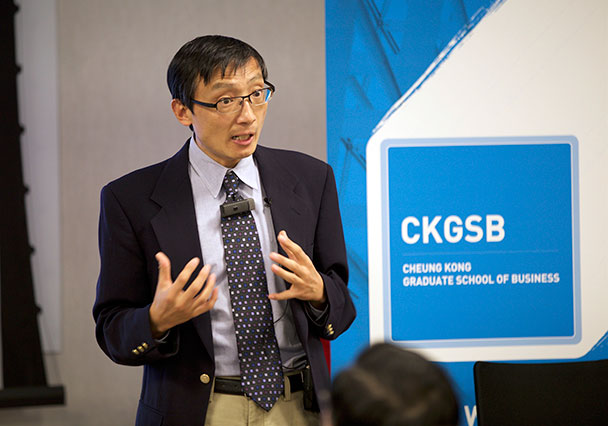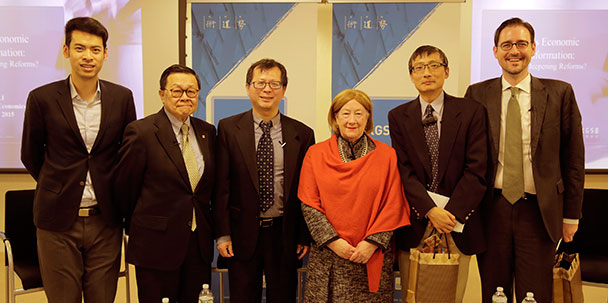CKGSB Economics Professor Li Wei, creator of the CKGSB Business Conditions Index (BCI), told a Knowledge Series audience this week that China must accelerate its planned economic reforms to put manufacturing resources to better use as the nation’s debt and overcapacity problems worsen.
During the session entitled “Where Is the Chinese Economy Heading?”, Prof Li said that, in the short term, reforms may trigger a greater slowdown with rising unemployment as China restructures its industries burdened by excess capacity and debts while overhauling local government finances, but added that for the long-term health of the Chinese economy, “this is an unavoidable step.”

CKGSB Professor Li Wei discusses his Business Confidence Index at a Knowledge Series
session on the Chinese economy. The index, launched in 2011, measures the business
sentiment of Chinese executives about China’s macro-economic environment.
Drawing on Professor Li’s four-year-old BCI survey, the symposium, held at CKGSB’s New York office, sought to shed light on the prospects for China’s economy, which is seeing slowing output and rising layoffs. The data are collected from a sample of leading enterprises whose executives have studied or are studying at CKGSB.
In the survey questionnaire, the executive respondents are asked to indicate whether their firm’s sales, profits, inventory levels and external financing conditions are expected to improve, stay the same or deteriorate in the next six months compared to the same period in the previous year. Based on data collected, diffusion indices are then constructed. The overall BCI is the composite index that reports the simple average of sales, profits, inventory and external financing indices. The index was developed to complement existing macroeconomic indicators which tend to use samples that under weigh private businesses.
“Most of our student body works in the private sector,” Professor Li said. “So I thought this would be a great complement to the existing PMI datasets. We call it the Business Conditions Index because we want the data to show not only cyclical changes, but also to allow us to infer structural problems we have in the economy.”
In the monthly survey, executive respondents are also asked to indicate directional changes in overall costs, labor costs and prices of their primary products and services. Since the CKGSB Case Center and Center for Economic Research, which jointly run the survey, started to collect the data in November 2011, sample firms have been faced with marked increases in costs in recent months, but have been largely unable to pass cost increases onto their customers by raising their prices. This clearly suggests that excess capacity in China is widespread across several industries.
Yet the data also highlight an optimistic attitude among Chinese entrepreneurs, who say they plan to continue expansion by investing more in fixed assets and by hiring more workers.
Slight optimism
In February, the CKGSB BCI registered 55.8, up from January’s reading of 51.2, which itself was a mark of only slight optimism, since anything below 50 is pessimistic. Component indices on profits, inventory levels, corporate investment and labor demand also saw improvement, while the external financing conditions index rose slightly, but remained below the 50 break-even level.
The CKGSB BCI indices are higher than government and industry indices because the sample firms – those run by current or former CKGSB students – are in a relatively stronger competitive position in their respective industries, so the conditions that most companies are experiencing in China are likely worse.
The panel discussion that followed Prof Li’s presentation highlighted the Chinese government’s effort to restructure companies, in particular, state-owned ones, in manufacturing sectors that are suffering from massive excess capacity. In December, Chinese leaders pledged to move forward with new programs, initiatives and funding to spur entrepreneurial growth and innovations while using fiscal and monetary tools to prevent a marked slowdown in short-term growth.

From left to right: Alan Chen, Director of CKGSB Americas; Henry Tang, Managing Partner at Carnegie Towers Strategic Investment Advisory; Cao Huining (Henry), Professor of Finance and Chair of the Finance Department at CKGSB; Michael McDonough, Global Director of Economic Research and Chief Economist at Bloomberg LP.
Overcapacity and rising leverages are two sides of the same coin. “Uncompetitive industries are unable to gain sufficient profits or cash flows from operations alone, so in order to function, survive and even expand, burgeoning debts have been accumulated,” Professor Li said as he discussed the implications that can be drawn from the data.
Bright spot
Professor Li also said that private and public consumption of goods and services remains one of the bright spots in China’s slowing economy. Retail sales grew more than 10% in 2015 and continued to grow at 10.2% in the first two months of 2016, according to data from China’s National Bureau of Statistics. That robust rise in retail sales occurred as GDP grew 6.9% from a year before, the slowest annual expansion in 25 years, implying that the Chinese economy is undergoing much needed structural rebalancing.
Asked during an audience Q&A segment what aspects of China’s economic malaise the panelists would like to see better explained to Western investors, panelist Henry Tang, Managing Partner at Carnegie Towers Strategic Investment Advisory, said the West’s pessimism about China’s economic prospects is frustrating.
“Everybody is always looking for when the hard landing will arrive,” he said. “And they’ve always been wrong. So there needs to be some leap of faith that perhaps China has the ability to do mid-course corrections that don’t exist in other economies.”
Another panelist, Michael McDonough, Global Director of Economic Research and Chief Economist for Bloomberg Intelligence, suggested that the Chinese government’s long-range view of the current economic malaise must be factored into analyses of China’s economic management strategy.
“The government is not thinking in days or months,” McDonough said. “They’re thinking in 100 years. So in that sense, it’s been surprising how quickly some of the reforms have gone.”
Cao Huining (Henry), a Professor of Finance and chair of the Finance Department at CKGSB, commenting on a question about the Chinese government’s intervention in recent stock market turbulence, said that regulators are struggling to learn how to rebalance the economy with a focus on a market-based model. “It takes time to learn how to deal with the market,” he said.
Professor Cao explained that regulators simply were not familiar with the situation they were facing when stock prices collapsed last summer following a big run-up. “They got pretty nervous,” he said.
About CKGSB Knowledge Series
CKGSB’s Knowledge Series continues each month with more exciting events to be announced. Knowledge Series memberships are available for young professionals, VIPs and corporations. For information, please contact Julie Zhu at juliezhu@ckgsb.edu.cn or +1-646-627-7729.